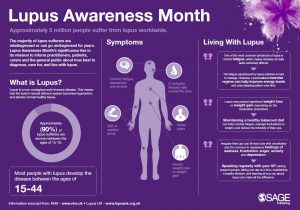 Lupus is an autoimmune disease wherein the immune system attacks healthy cells and tissues, causing inflammation. It can affect any organ of the body; in systemic lupus erythematosus (SLE), multiple parts of the body can be affected, including the skin, joints, kidneys, heart, and brain. Because Lupus can affect so many organs and the symptoms can be so diverse, including fatigue, rashes, allergies, depression and kidney failure it’s called the ‘great mimic’ and is often be misdiagnosed. Lupus can range from mild to life-threatening and should always be treated by a doctor, generally a rheumatologist who will regularly access and manage disease activity.
Lupus is an autoimmune disease wherein the immune system attacks healthy cells and tissues, causing inflammation. It can affect any organ of the body; in systemic lupus erythematosus (SLE), multiple parts of the body can be affected, including the skin, joints, kidneys, heart, and brain. Because Lupus can affect so many organs and the symptoms can be so diverse, including fatigue, rashes, allergies, depression and kidney failure it’s called the ‘great mimic’ and is often be misdiagnosed. Lupus can range from mild to life-threatening and should always be treated by a doctor, generally a rheumatologist who will regularly access and manage disease activity.
Studies have shown that lupus affects approximately 1 in 1,000 people in the UK, but the condition is underdiagnosed. Lupus UK reported last year that there is a delay of over 6 years on average between a person developing symptoms and receiving a diagnosis. In that time sufferers are routinely told that they have anxiety or other psychological health conditions which exacerbate their physical health conditions.
Hypnotherapy is seen by various UK lupus charities as a useful way of relieving stress, preventing flare ups and slowing down the disease progress, while allowing patients to deal better with pain, anxiety and reducing the amount of medication required on a daily basis.

All ages and sexes can be affected, but like all autoimmune disorders the majority of people affected are young females. In the case of lupus it especially affects those of African and Asian ancestry.
While the exact cause of lupus is not known it shares a common development pathway with other autoimmune conditions. Exposure to viruses, prolonged periods of stress, trauma and pregnancy are all known to be triggers for autoimmune conditions. Studies have found that traumatic life events can elevate the risk of developing lupus three-fold.
The National Council for Hypnotherapy (NCH) states that hypnotherapy offers a variety of tools and techniques that change clients’ mind set and approach to events; giving them resilience to ride out challenging times while enabling them to keep stress hormones to a minimum. These techniques result in greatly reduced levels of cortisol and adrenaline limiting the likelihood of lupus flare ups and potentially slowing the damaging course of this illness.
Hypnotherapy involves bringing a client into a state a state of focused and attentive concentration where they can make changes to their instinctive thought patterns and habitual behaviours. Hypnotherapy has been studied as a tool for managing a variety of problems including chronic pain syndromes, irritable bowel, fibromyalgia and arthritis.
The Hibbs Lupus Trust offers monthly group hypnosis sessions at the Cannock Hospital which range from deep relaxation to more focused and specific interventions for lupus to assist in managing both the physical and mental health impacts of the condition. By assisting patients with lupus to better manage their mental health they can avoid adding antidepressants, anxiolytics and sedatives to their daily medication cocktail.
To find someone who can support you with your lupus diagnosis, use the NCH directory, which lists therapists near you.
